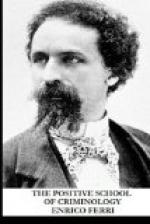Of course, in this first lecture I cannot give you even a glimpse of the positive results of that modern science which has studied the criminal and his environment instead of his crimes. And I must, therefore, limit myself to a few hints concerning the historical origin of the positive school of criminology. I ought to tell you something concerning the question of free will. But you will understand that such a momentous question, which is worthy of a deep study of the many-sided physical, moral, intellectual life, cannot be summed up in a few short words. I can only say that the tendency of modern natural sciences, in physiology as well as psychology, has overruled the illusions of those who would fain persist in watching psychological phenomena merely within themselves and think that they can understand them without any other means. On the contrary, positive science, backed by the testimony of anthropology and of the study of the environment, has arrived at the following conclusions: The admission of a free will is out of the question. For if the free will is but an illusion of our internal being, it is not a real faculty possessed by the human mind. Free will would imply that the human will, confronted by the choice of making voluntarily a certain determination, has the last decisive word under the pressure of circumstances contending for and against this decision; that it is free to decide for or against a certain course independently of internal and external circumstances, which play upon it, according to the laws of cause and effect.
Take it that a man has insulted me. I leave the place in which I have been insulted, and with me goes the suggestion of forgiveness or of murder and vengeance. And then it is assumed that a man has his complete free will, unless he is influenced by circumstances explicitly enumerated by the law, such as minority, congenital deaf-muteness, insanity, habitual drunkenness and, to a certain extent, violent passion. If a man is not in a condition mentioned in this list, he is considered in possession of his free will, and if he murders he is held morally responsible and therefore punished.
This illusion of a free will has its source in our inner consciousness, and is due solely to the ignorance in which we find ourselves concerning the various motives and different external and internal conditions which press upon our mind at the moment of decision.
If a man knows the principal causes which determine a certain phenomenon, he says that this phenomenon is inevitable. If he does not know them, he considers it as an accident, and this corresponds in the physical field to the arbitrary phenomenon of the human will which does not know whether it shall decide this way or that. For instance, some of us were of the opinion, and many still are, that the coming and going of meteorological phenomena was accidental and could not he foreseen. But in the meantime, science has demonstrated that they are likewise subject to




